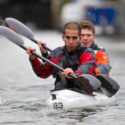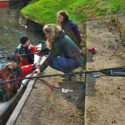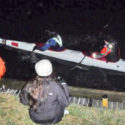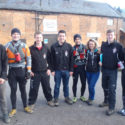Saturday 30th March marked the start of the Devizes to Westminster Canoe Marathon for members of Southampton UOTC. Unknown to the crew, it would be the coldest, most gruelling conditions ever seen in DW history. The DW race involves kayaking 125 miles from the quaint town of Devizes in Wiltshire to Westminster Bridge, London and is often called ‘the poor man’s Everest’. Two-man crews endeavour to complete this non-stop race in less than 24 hours, but completion alone is no mean feat. A normal race would see one third of crews drop out; this year saw nearly 50% of crews retire due to exhaustion and/or hypothermia.
Team Southampton UOTC comprised of 2 paddlers (Mike and Rory) and a support crew of 8 officer cadets. Recent successes in preparatory races gave the team an overall estimated finishing time of 23 hours 35mins for the DW. Although only the paddlers would formally compete in the race, every member of the support crew would prove to be absolutely crucial, not too dissimilar to a pit stop team in a Formula 1 race.
A quietly confident crew set off from Devizes at 0854hrs on Saturday morning. The support team had separated into two vehicles and would leap frog each other at each meeting point ensuring there were no missed stops for the crew. It was imperative that the support crew met the paddlers at every opportunity to keep them well fed, warm and hydrated throughout. The first 3 hours of the race were relatively uneventful, with no portages and only two scheduled stops. However, after this long stretch of water, the ‘assault course’ began – a 24 mile stretch of canal with over 30 locks to portage. Quick exits, fast running and swift put-ins allowed for valuable time to be made over the older, more ‘seasoned’ crews. The first kit change took place after 7 hours of solid paddling; it was here that several Southampton UOTC staff members met the crew to provide a boost in morale. Another 5 hours of robust paddling brought the team to a compulsory portage just past Reading. It was here where the night stage began – a colossal drop in temperature and visibility where any crew that was deemed too tired or cold to continue were forcibly retired. Reading also marked the end of the canal and the start of the River Thames, where strong river flow gave all paddlers a much needed helping hand. Fortunately, Mike and Rory had survived all day with very few injuries other than blisters, sore wrists and back pains. A competent support crew provided hot food and quick treatments and hastily got the paddlers back on their way.
The first few hours of the Thames proved fruitful. Scheduled stops were made on time and the support vehicles made easy work of navigating the dark country lanes to the locks. However, disaster struck in the form of an ice cold capsize at Bray lock. Choppy conditions and a slight lapse in concentration meant Mike and Rory had to continue into the night cold, wet and with ice forming on the boat. The support crew made a sterling effort of providing hot drinks, hot food and morale for the paddlers, paying special attention to any intensifying symptoms of hypothermia. A much needed change into dry kit was brought forward at Romney after a tactical decision by the support crew; however, another capsize swiftly defied any attempt at staying warm. The first capsize had made the race exponentially harder, and balancing the boat became difficult due to the violent shivering and flowing conditions. Unfortunately, at Old Windsor lock the team were forced to retire when an ambulance was called to treat Mike for hypothermia. In total, the crew had paddled for nearly 19 hours, with 5 capsizes in -4 degrees and only 30 miles left.
In times of extreme adversity, the paddlers and support crew showed courage, teamwork, initiative and endurance. The greatest challenge for all, aside from battling the elements, was attempting to effectively communicate between paddlers, support crew and vehicles. The expedition to Westminster allowed every individual the chance to put into practice a variety of skills learnt at Southampton UOTC; skills that will invariably benefit them in the future, be it in civilian or military careers. Despite a lack of medals this year, establishing this expedition has paved the way for future cadets of Southampton UOTC to support and compete in the notorious Devizes to Westminster Race.
M J Thaibsyah, Senior Under Officer, D Company




